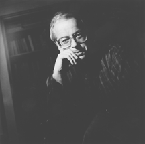Spirit of '96
Rosebud: Orson Welles biographer David Thomson talks pictures.
Wellesian, Wellsian, and well done
By David Templeton
IT IS LUNCHTIME, Wednesday, July 3, the official release-date for the spectacularly hyped Independence Day, and San Francisco author David Thomson seems surprisingly energetic for a man who rose well before dawn to go to the movies.
Last evening, in a clever stunt occurring in 24 cities across the nation, selected theaters began showing the film around the clock, a schedule that would continue until, well, Independence Day.
"I took my son to the 7 a.m. showing, thinking that would be our best opportunity to get in without waiting hours in line," Thomson explains, holding open the door at the sunny Italian café he has selected for our conversation. (Knowing that I would be unable to join him at sunrise, I found myself spending a two-hour wait to see a 3:15 a.m. showing of this spirited film about invading aliens and the plucky humans who fight back.)
And what did Thomson think?
"I thought it was a good show," he admits, quickly adding, "It's a very simple-minded film, don't get me wrong. But there is a story there, and half a dozen characters that are very appealing, on a very, very, comic-book level.
"I didn't resent it the way I resent most of these kinds of films."
Thomson is a renowned author and film critic whose works include the invaluable Biographical Dictionary of Film (Knopf, 1974, 1980, 1994), for which the New York Times proclaimed him "one of the finest film critics in the English language," as well as several novels and the biographies of David O. Selznick and Warren Beatty. His newest work is the affectionately probing Rosebud: The Story of Orson Welles (Knopf, 1996). Lyrical and uncompromising, Thomson's examination of Welles is as exhilarating as it is tragic, as light and magical in tone as Welles' own image was dark and morose and unyielding.
"I have to say," Thomson grins, "that although I fundamentally despise this type of effects-driven film--because I believe film is a medium for photographing reality and it's becoming a medium for electronically invented things that are not real--even so, seeing this film today in the first 24 hours of its life, there was a real sense of occasion. There was a real buzz in the theater.
"And I like that. I'm very old-fashioned. I like going to movies in packed houses with people who are excited just to be there. I remember, and treasure, being a child and going to the movies. You couldn't be sure you'd get in. You might have to stand in line a long time. The cinema would be packed, and you'd have a bad seat. And all of those things added to the excitement. I was lucky, because in the late '40s and early '50s when I first went to the movies it was still like that. All the time."
Yet in the early days of film, the public was more inclined to fall in love with a film that was about characters. Filmgoers believed in the stories, bought into the characters' personal dilemmas without hesitation. In Welles' day, the public would make a hit of a film like Gone with the Wind or North by Northwest or Stagecoach, films about human beings.
Nowadays, the most financially successful movies are those that feature aliens or dinosaurs or unstoppable robots. What happened?
"It's a hugely complicated issue," Thomson sighs. "I think there was a period, the '20s, '30s, and '40s certainly, when the movie was the machine for popular entertainment. People believed in the movies. They just immersed themselves in those stories and they got the experience down.
"Now we're all a lot hipper about film. We've become a little smarter, a little less naive, less gullible. We teach film appreciation in colleges. We've became connoisseurs of the nature of structure. Our attitude has changed, and as a result, films seldom suck us in the way they used to, because we are less easily made to believe.
"I regret it terribly," he nods. "I mourn for the Golden Age of films."
Wouldn't Welles himself have loved this, though? The man who caused a national panic with the radio presentation of H. G. Wells' War of the Worlds in 1938. The man who pushed the limitations of film photography with Citizen Kane, who saw the technical barriers of filmmaking, and ignored them. And wouldn't he have loved luring thousands of people into standing on the sidewalk all night to see one of his films?
"Probably," Thomson agrees. "He was a magician by instinct and by training. I think that the magic of what you can do now, the way you can change reality,and make people believe they've seen something they haven't seen, I think that would have appealed to him.
"The ability to trick people always appealed to him."
This page was designed and created by the Boulevards team.

Penni Gladstone
Petaluma writer David Templeton takes interesting people to interesting movies in an ongoing quest for the ultimate post-film conversation. This time out, he talks with renowned author, film critic, and Orson Welles biographer David Thomson about the movie-house phenomenon, Independence Day.
From the July 11-17, 1996 issue of Metro
Copyright © 1996 Metro Publishing and Virtual Valley, Inc.
